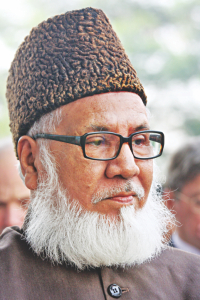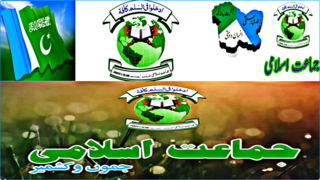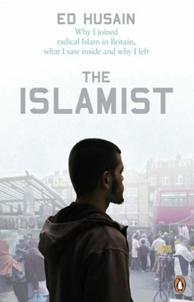Islamism refers to a broad set of religious and political ideological movements. The advocates of Islamism, also known as "al-Islamiyyun", are dedicated to realizing their ideological interpretation of Islam within the context of the state or society. The majority of them are affiliated with Islamic institutions or social mobilization movements, often designated as "al-harakat al-Islamiyyah." Islamists emphasize the implementation of sharia, pan-Islamic political unity, the creation of Islamic states, and rejection of non-Muslim influences.

Hezb-e-Islami, lit. Islamic Party, was an Islamist organization that was commonly known for fighting the Communist Government of Afghanistan and their close ally the Soviet Union. Founded and led by Gulbuddin Hekmatyar, it was established in Afghanistan in 1976.

Jamaat-e-Islami, or Jamaat as it is commonly known, is an Islamist political party based in Pakistan and founded by Abul Ala Maududi. It is the Pakistani successor to Jamaat-e-Islami, which was founded in colonial India in 1941. Its objective is the transformation of Pakistan into an Islamic state, governed by Sharia law, through a gradual legal and political process. JI strongly opposes capitalism, communism, liberalism, and secularism as well as economic practices such as offering bank interest. JI is a 'vanguard party', whose members are intended to be leaders spreading party beliefs and influence. Supporters not thought qualified to be members may become 'affiliates', and beneath them are 'sympathizers'. The party leader is called an 'ameer'. Although it does not have a large popular following, the party is quite influential and considered one of the major Islamic movements in Pakistan, along with Deobandi and Barelvi.

Pan-Islamism is a political movement which advocates the unity of Muslims under one Islamic country or state – often a caliphate – or an international organization with Islamic principles. Historically, after Ottomanism, which aimed at the unity of all Ottoman citizens, Pan-Islamism was promoted in the Ottoman Empire during the last quarter of the 19th century by Sultan Abdul Hamid II for the purpose of preventing secession movements of the Muslim peoples in the empire.

Jamayat-E-Islami, sometimes shortened to Jamiat, is a predominantly Tajik political party and former paramilitary organisation in Afghanistan. It is the oldest and largest functioning political party in Afghanistan, and was originally formed as a student political society at Kabul University. It has a communitarian ideology based on Islamic law. During the Soviet–Afghan War and the following Afghan Civil War against the communist government, Jamiat-e Islami was one of the most powerful of the Afghan mujahideen groups. Burhanuddin Rabbani led the party from 1968 to 2011, and served as President of the Islamic State of Afghanistan from 1992 to 2001, in exile from 1996.

Tehreek-e-Jafaria Pakistan, formerly Tehreek Nifaz Fiqah-e-Jafaria Arif Hussaini/Sajid Naqvi Group was the Shia political party in Pakistan from 1979 to 2000. Belonging to the Ja'fari school of Islamic jurisprudence, TNFJ was founded in 1979 by Syed Arif Hussain Al Hussaini supported by Grand Ayatollah Muhammad Hussain Najafi Dhaku. Its creation coincided with the enforcement of controversial Islamic laws by then President of Pakistan, General Mohammad Zia-ul-Haq. At the same time, 1979 Iranian Revolution in Shi'a Iran added extra confidence and comfort in the movement.
The Islamic Foundation is Jamaat-e-Islami's research and publishing house in the United Kingdom. It was established in 1973 by two high-ranking Pakistani activists of Jamaat-e-Islami, Khurshid Ahmad and Khurram Murad. Its objectives are to research into the implementation of Islam in the modern world, to project the image of Islam in Britain and Europe, and to meet the educational needs of Muslims.

Motiur Rahman Nizami was a politician, former Minister of Bangladesh, Islamic scholar, writer, and the former leader of the Bangladesh Jamaat-e-Islami. He is noted for leading the terror squad Al-Badr during the Bangladesh Liberation War. On 29 October 2014, he was convicted of masterminding the Demra massacre by the International Crimes Tribunal of Bangladesh. Nizami was the Member of Parliament for the Pabna-1 constituency from 1991 to 1996 and again from 2001 to 2006. He also served as the Bangladeshi Minister of Agriculture and Minister of Industry.

The Islamic Society of Britain (ISB) was set up in 1990 for British Muslims to promote Islamic values. Its youth wing is The Young Muslims UK (YMUK).

The Jamaat-e-Islami Kashmir or Jamaat-e-Islami Jammu and Kashmir (JIJK) is an Islamic political party based in the city of Srinagar in the Indian administered territory of Jammu and Kashmir. It is distinct from the Jamaat-e-Islami Hind. The organisation's stated position on the Kashmir conflict is that Kashmir is a disputed territory and the issue must be sorted as per UN or through tripartite talks between India, Pakistan and representatives of Kashmir.
Islamic revival refers to a revival of the Islamic religion, usually centered around enforcing sharia. A leader of a revival is known in Islam as a mujaddid.

The Islamist: Why I Joined Radical Islam in Britain, What I Saw Inside and Why I Left is a 2007 book about Ed Husain's five years as an Islamist. The book has been described as "as much a memoir of personal struggle and inner growth as it is a report on a new type of extremism." Husain describes his book as explaining "the appeal of extremist thought, how fanatics penetrate Muslim communities and the truth behind their agenda of subverting the West and moderate Islam."
The Federation of Islamic Organizations in Europe (FIOE) was founded by the Muslim Brotherhood in 1989. FIOE subsequently created the European Council for Fatwa and Research, a pan European Muslim Brotherhood organisation which provides guidance to Muslims in Europe. According to its website, it has "hundreds of member organizations spread across 28 European States, all subscribing to a common belief in a methodology based on moderation and balance, which represents the tolerance of Islam" The FIOE has a headquarters office in Brussels and has had some success in positioning itself as a dialog partner for the EU and other important institutions. Funding for the FIOE is derived largely from Gulf sources, including the Mohammed bin Rashid Al Maktoum Foundation and the Waqf Ministry in Kuwait. In February 2014, the FIOE elected Abdallah Ben Mansour as its new President replacing Chakib Ben Makhlouf.

Bangladesh Jamaat-e-Islami, previously known as Jamaat-e-Islami Bangladesh, is the largest Islamist political party in Bangladesh.
Jamaat-e-Islami is an Islamist fundamentalist movement founded in 1941 in British India by the Islamist author, theorist, and socio-political philosopher, Syed Abul Ala Maududi, who was inspired by the Muslim Brotherhood. It is considered one of the most influential Islamist organisations, and was the first to develop an ideology based on the modern revolutionary conception of Islam. Its founding branch in Pakistan is the nation's largest fundamentalist party.

UK Islamic Mission (UKIM) is a registered charity and Islamic organization based in the United Kingdom. It was established in 1963 to organise a network of study circles and mosques. The members of the Jamaat-e-Islami movement are said to be active in the organisation.
Islamism has existed in the United Kingdom since the 1970s, and has become widely visible and a topic of political discourse since the beginning of the 21st century.
The Muslim Association of Britain (MAB) is a British Sunni Muslim organisation founded in 1997. MAB has been well known for its participation in the protests opposing the Iraq War. More recently, it has been known for promoting Muslim participation in Britain.











